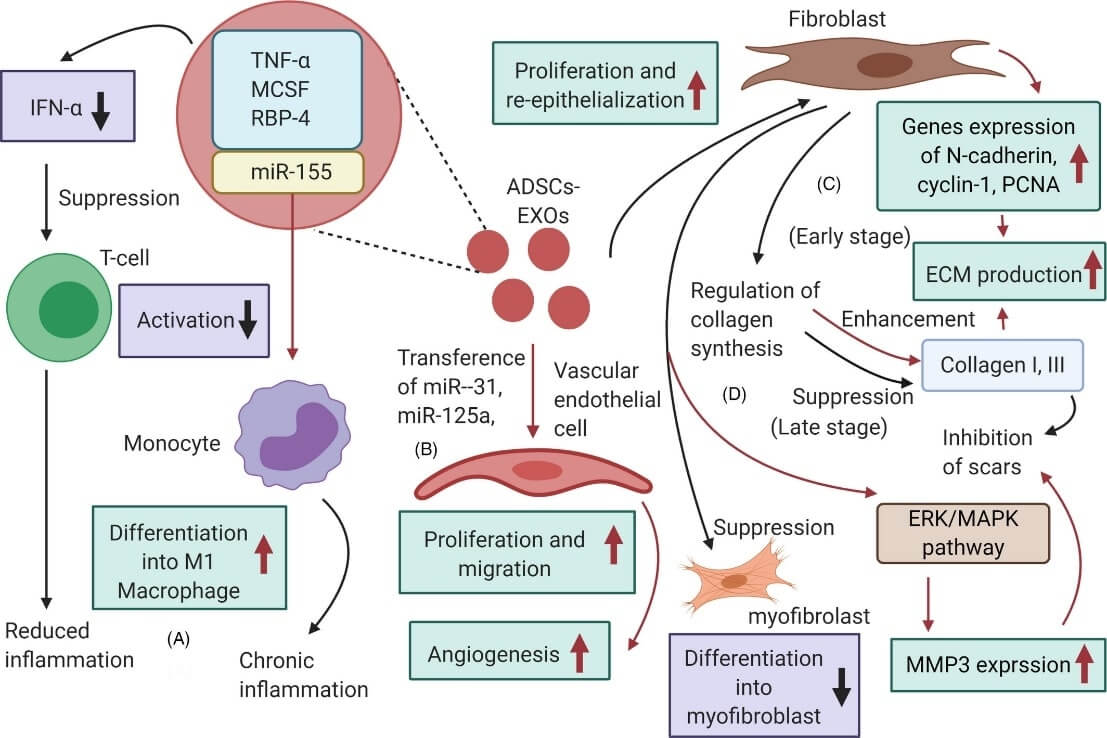Therapeutic Exosomes for Skin Wound Healing
Skin wound is broken in the cuticular layer, mucous membranes, or tissues due to disease or outer violence. Severe skin damage cannot heal on its own and often requires manual intervention. Exosomes participate in the signal transduction of cells around the wound. In recent years, studies have found that exosomes derived from different cells promote the occurrence and development of wound inflammation, fibroblast proliferation and migration, microvascular regeneration, and stratum corneum formation. Creative Biolabs is the world's leading exosome service provider and has been working with customers to find exosome drugs that promote skin wound healing.
The Process of Skin Wound Healing
The skin is the largest organ of the human body. It can be used as the first line of defense to help us resist external stimuli. At the same time, it has a certain ability to repair itself. However, when the damaged area of the skin is too large, it is difficult to heal normally, in the case of diseases such as sexually transmitted diseases or venous stasis. Therefore, accelerating skin tissue regeneration and restoring the function of damaged skin is the key to skin tissue regeneration and repair. Wound healing relies on a series of ordered cell development and complete biochemical reactions in the subcutaneous tissue. The healing process can be roughly divided into 4 stages: hemostasis, inflammation, proliferation, and remodeling. Abnormality in any of these links will cause the wound to not heal normally. Excessive scarring can not only cause psychological problems by affecting the appearance, but scarring that occurs in the joints can also lead to joint contractures, resulting in physical dysfunction. Therefore, how accelerating wound healing and reducing scarring are the two main problems currently faced in the field of skin wound healing.
Therapeutic Exosomes to Accelerate Skin Wound Healing
Exosomes derived from different stem cells can promote wound healing and inhibit scar formation by regulating multiple stages such as inflammatory response, cell proliferation and migration, angiogenesis, and collagen deposition, and have good application prospects in skin wound healing. Researchers have found that mesenchymal stem cell-derived exosomes (MSC-Exo) are taken up and internalized by fibroblasts, promoting early collagen synthesis while inhibiting late hypertrophic scar fibroblast proliferation. miR-223 in MSC-Exo can induce the polarization of macrophages in the wound area by targeting pknox1 so that inflammatory cells can effectively translocate to the wound site and stimulate wound inflammation. Different collagen repairs are presented in different stages of wound healing to inhibit scar hyperplasia. In addition, adipose-derived stem cell-derived exosomes (ADSCs-Exo) can promote the proliferation and migration of fibroblasts at an early stage and stimulate the expression of N-cadherin, cyclin-1, PCNA, collagen I, and collagen III. In late stages, ADSCs-Exo can prevent fibroblast differentiation into myofibroblasts and reduce scarring by inhibiting collagen formation and activating the ERK/MAPK pathway to increase MMP3 expression.
 Fig.1 Mechanisms by which ADSCs-EXOs may promote wound healing.1,2
Fig.1 Mechanisms by which ADSCs-EXOs may promote wound healing.1,2
Although direct injection is the most commonly used method for exosome delivery, it is inconvenient in practical application in skin wound healing. To maintain the bioactivity and efficient release of exosomes during prolonged wound care, the carrier medium for exosomes needs to be optimized. Wound dressings that combine exosomes with biocompatible hydrogels are an approach that allows for the controlled release of exosomes in the wound area. Alginate hydrogel incorporated ADSCs-Exo (Alg-Exo) has been found to accelerate epithelial regeneration, promote collagen maturation and improve angiogenesis, thereby accelerating wound healing.
Creative Biolabs has been continuously learning and exploring exosome technology, providing customers with the most comprehensive one-stop exosome service at any time. You are welcome to contact us to discuss your ideas, we are willing to work with you to open the door to exosome therapy.
References
-
An, Y.; et al. Exosomes from adipose-derived stem cells and application to skin wound healing. Cell Proliferation. 2021, 54(3):e12993.
-
under Open Access license CC BY 4.0, without modification.
For Research Use Only. Cannot be used by patients.
Related Services:

 Fig.1 Mechanisms by which ADSCs-EXOs may promote wound healing.1,2
Fig.1 Mechanisms by which ADSCs-EXOs may promote wound healing.1,2









